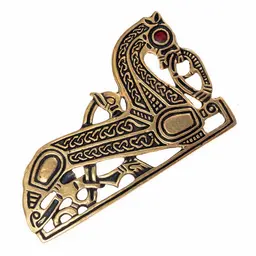Product description
The horse-shaped brooch was discovered along with another mirrored brooch, forming a pair, in the Viking Age grave Bj 854, accompanied by other grave goods. This is an extraordinary find, as these brooches differ from the typical Viking oval brooches. Positioned below the shoulders, one on the left and one on the right, they clearly served the purpose of fastening the dress of the Viking woman buried there. The brooch features an eye inlaid with red glass enamel instead of the garnets found on the original piece. The replica is available in high-quality bronze. On the back is a sturdy pin, suitable for fastening even heavy woollen fabrics, and the dimensions are 5.4 x 3.2 cm.
The original brooches were uncovered in the 1870s by archaeologist Hjalmar Stolpe in the grave Bj 854 in Birka, on the island of Adelsö in Upland, Sweden. They were crafted from partially gilded silver and adorned with garnet-inlaid eyes. These horse brooches are believed to have been produced in Scandinavia and were buried in a 10th-century Viking tomb. However, stylistic analysis suggests that the horses themselves likely date from the 6th or 7th century.
The design and craftsmanship indicate that the horses may have originally been created as decorative fittings. Later, they were adapted with a pin mechanism to function as brooches. This adaptation hints at their long-standing significance, possibly as heirlooms passed down through generations within the family before being interred in the grave.
Details:
Material: bronze
Dimensions: 5.4 x 3.2 cm
Right-side version also available, to create a pair
Based on a historical original
Shipment weight (g): 100 *
This item is produced in limited quantities only. This means that every piece is unique. Sizes & finish may vary lightly from piece to piece.
When packaging this item, we exclusively use 100% recycled plastic and recycled paper/cardboard from FSC certified forests. We reuse a large part of the material directly without the intervention of a recycling process.
Recycle the material by separating your waste:
1. Cardboard: separate or reuse your paper.
2. Plastic cushions, clothing bags and plastic tape: separate or reuse your plastic. If possible, pierce the cushions with a volume reduction needle.
3. Paper packaging for jewelry and small items: these have a plastic inner layer. Remove these, then separate your paper and plastic.
Read here about how we are committed to sustainability.






